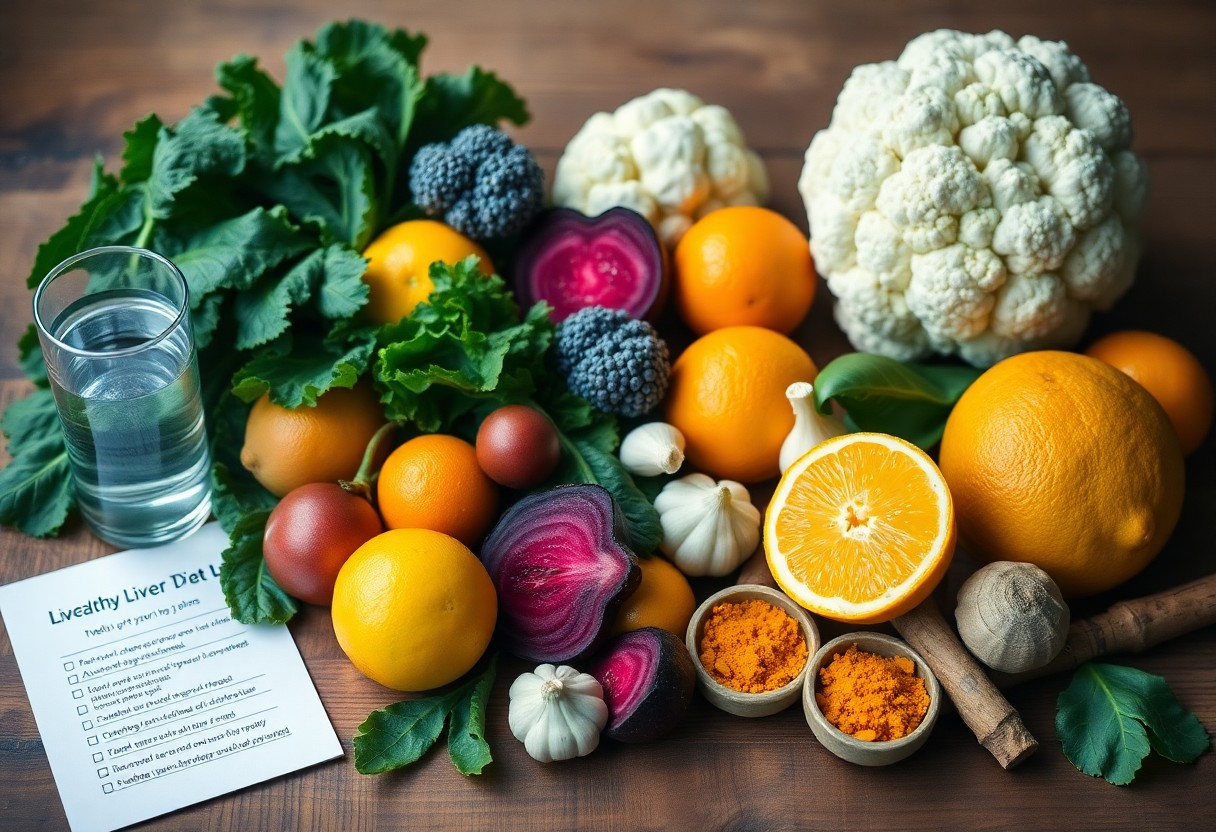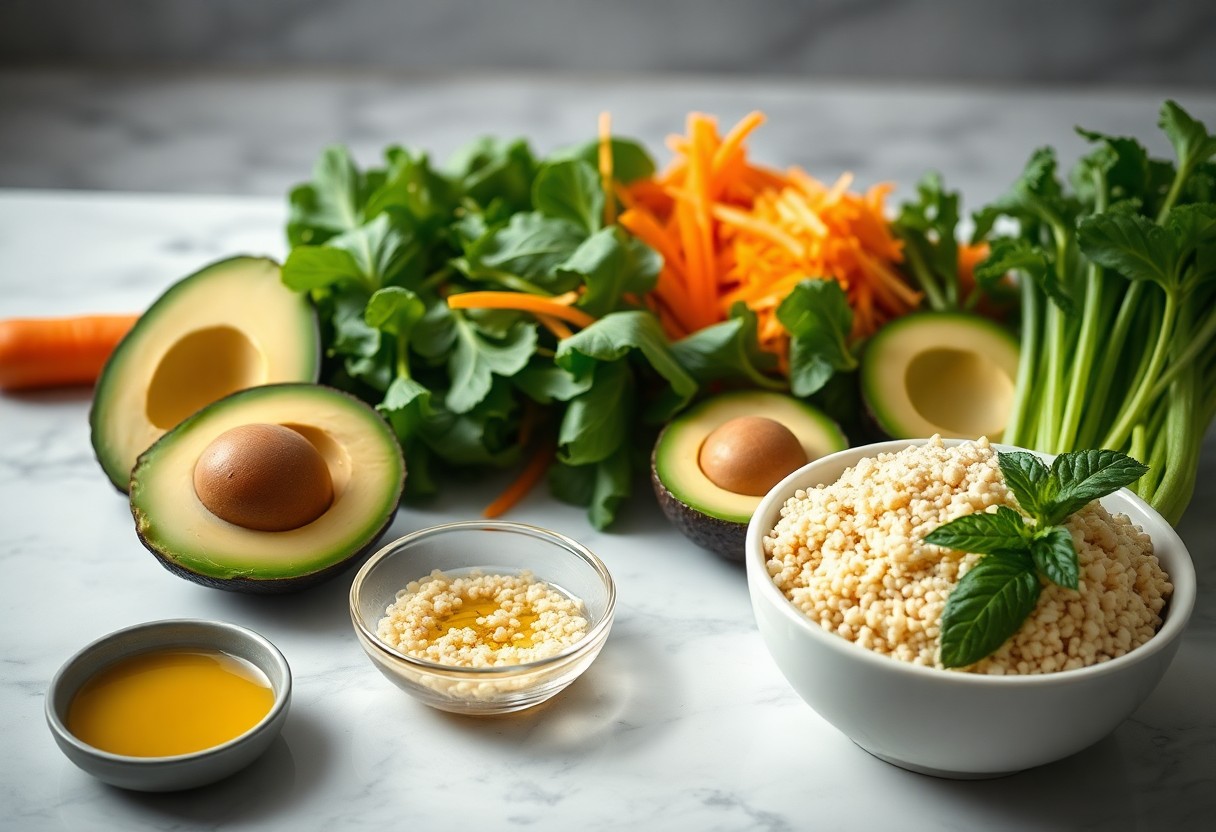It's necessary to prioritize the health of your liver, as it plays a vital role in detoxification and overall well-being. A well-balanced diet can significantly enhance liver function and promote natural cleansing. In this blog post, you'll discover foods that can support your liver, helping you to feel more energized and improve your body's ability to process toxins. Dive into the key components of a healthy liver diet plan and learn how making simple changes can have a profound impact on your liver health.

The Role of the Liver in Overall Health
Your liver is a powerhouse that impacts every aspect of your well-being. It processes nutrients absorbed from the food you eat, metabolizes drugs, detoxifies harmful substances, and produces important proteins for blood clotting and other functions. This dual responsibility of processing and detoxifying ensures that your bloodstream remains clean and balanced, which in turn supports your immune system and overall energy levels. A well-functioning liver contributes significantly to your vitality and health.
Critical Functions of the Liver
Signs of Liver Dysfunction
Identifying liver dysfunction can often be challenging, as symptoms may develop gradually and can be easily mistaken for other conditions. Common signs include unexplained fatigue, jaundice (yellowing of the skin and eyes), dark urine, abdominal swelling, and intense itching. Changes in appetite and weight loss may also signal underlying liver issues.
Vigilance is important when it comes to liver health. If you experience persistent fatigue coupled with jaundice or abdominal pain, these symptoms could indicate a problem. The liver can endure damage without producing obvious symptoms until it's significantly impaired, making routine check-ups vital. Early detection through blood tests and imaging studies can help you manage liver health more effectively, mitigating the risk of more serious complications down the line.

Foods That Promote Liver Cleansing
Your diet can play a significant role in enhancing your liver's detoxification abilities. Incorporating specific foods known for their cleansing properties can support liver function and overall health. Focus on nutrient-dense options that help eliminate toxins, reduce inflammation, and promote bile production, which is imperative for digesting fats and removing waste. These foods contain important vitamins, minerals, and antioxidants that nourish the liver and aid its natural detox process, ensuring it operates at peak efficiency.
Nutrient-Packed Vegetables and Fruits
The Importance of Hydration
Staying hydrated is imperative for optimal liver function. Water aids in the transportation of nutrients, helps the liver flush out toxins, and promotes digestion by maintaining healthy bile levels. Insufficient fluid intake can hinder the liver's ability to process and eliminate waste effectively. Incorporating herbal teas and infused waters can enhance your hydration routine, while fresh juices made from liver-friendly fruits and vegetables provide both hydration and nutritional support to keep your liver functioning smoothly.
Superfoods to Enhance Liver Performance
Integrating superfoods into your diet can significantly bolster your liver's efficiency. Foods rich in nutrients like beta carotene, omega-3 fatty acids, and antioxidants work synergistically to detoxify your liver and optimize its function. For more insights on how to effectively support liver health, check out Detoxing Your Liver: Fact Versus Fiction.
Beta Carotene and Omega-3 Fatty Acids
Including beta carotene and omega-3 fatty acids in your diet can enhance liver performance significantly. Foods like carrots and sweet potatoes are excellent sources of beta carotene, which aids in reducing liver inflammation. Meanwhile, fatty fish such as salmon or flaxseeds provide crucial omega-3s, known to improve liver fat levels and promote overall health.
Antioxidant-Rich Ingredients
Antioxidants are key players in protecting your liver from oxidative stress, which can lead to cellular damage. Ingredients like berries, dark leafy greens, and nuts pack a powerful antioxidant punch that helps neutralize harmful free radicals in the body. This not only supports liver health but also boosts your immune system.
Foods high in antioxidants, such as blueberries and spinach, have been linked to reduced liver damage and improved overall detoxification processes. These superfoods contain phytonutrients and vitamins that support the liver's ability to break down toxins. Incorporating these ingredients into your meals can be as simple as adding a handful of berries to your morning oatmeal or including a spinach salad as a side dish at dinner. By prioritizing these antioxidant-rich foods, you are making a smart choice for your liver's longevity and efficiency.
Practical Guidelines for Crafting a Liver-Friendly Meal Plan
Creating a meal plan that supports liver health involves selecting the right ingredients, maintaining balance, and ensuring variety. Opt for whole foods rich in vitamins and nutrients while minimizing processed items high in saturated fats and added sugars. You can explore Healthy Liver Diet Recipes: Foods Good for Your Liver to find delicious options that promote liver function.
Portion Control and Meal Timing
Adhering to proper portion sizes promotes healthy digestion and prevents overloading your liver. Aim for smaller, frequent meals that keep your energy levels stable and allow for efficient nutrient absorption. Establishing a consistent meal schedule, such as eating every 3-4 hours, can further enhance liver function and support metabolism.
Smart Cooking Techniques
Utilizing smart cooking methods can significantly enhance the nutritional quality of your meals. Techniques such as steaming, grilling, or baking emphasize the natural flavors of wholesome ingredients while avoiding excess fats. For instance, sautéing vegetables in a small amount of olive oil preserves their nutrients and taste, making them a perfect side for liver-friendly dishes.
Opting for techniques like steaming not only retains more vitamins and minerals compared to boiling but also helps reduce the need for added fats. You might also consider marinating proteins using citrus juices or herbs, which can enhance flavor and tenderness while being liver-friendly. Incorporating these techniques transforms everyday meals into appetizing liver-supportive options, showing that health and flavor can coexist.
Lifestyle Habits That Support Liver Health
Embracing positive lifestyle habits is necessary for maintaining your liver's integrity and functionality. Simple daily choices can have profound impacts, from your physical activity levels to your stress management techniques. These habits not only aid in detoxification but also improve overall wellbeing, allowing your liver to thrive while performing its vital tasks.
The Impact of Physical Activity
Regular physical activity plays a significant role in liver health. Engaging in moderate exercise, such as brisk walking or cycling, helps boost circulation and decreases the accumulation of fat in the liver. Aim for at least 150 minutes of moderate aerobic activity each week to enhance your liver's performance and maintain a healthy body weight.
Stress Management and Its Effects
High stress levels can exert a negative influence on liver function, as chronic stress often leads to unhealthy coping mechanisms, including poor eating habits and substance use. These behaviors can further disrupt liver functions, making effective stress management techniques, such as mindfulness, meditation, and adequate sleep, imperative for sustaining liver health. Prioritizing relaxation and healthy routines can fortify your liver against the toll of daily stressors.
Chronic stress triggers the release of cortisol, which can impair liver performance over time. Elevated cortisol levels lead to increased inflammation, potentially resulting in fatty liver disease or other liver-related issues. By implementing stress-reduction strategies, such as yoga or deep-breathing exercises, you can greatly reduce the adverse effects of stress on your liver. Prioritizing mental well-being not only contributes to emotional health but also supports your liver in its detoxifying role, reinforcing the importance of a balanced lifestyle for overall health.
Summing up
Conclusively, adopting a healthy liver diet plan is vital for maintaining your liver's vitality and function. Incorporate foods rich in antioxidants, healthy fats, and fiber to cleanse and support your liver. Be mindful of hydration and limit processed foods, alcohol, and excessive sugars. For more insights on how to manage your diet effectively, refer to the Diet and Liver Disease resources to enhance your liver health journey.
FAQ
Q: What foods are best for supporting liver health?
A: Incorporating a variety of foods that are rich in antioxidants, vitamins, and healthy fats can support liver health. Some of the best foods include leafy greens (like spinach and kale), cruciferous vegetables (such as broccoli and Brussels sprouts), avocados, turmeric, beets, fatty fish (like salmon), and nuts. These foods help reduce inflammation and improve liver function.
Q: How does hydration affect liver function?
A: Staying well-hydrated is important for liver health, as water helps the organ process and eliminate toxins from the body efficiently. Consuming enough fluids can also aid digestion and promote regular bowel movements, which are vital for preventing the buildup of toxins. Aim for at least 8 cups (64 ounces) of water a day, and consider drinking herbal teas, which can offer additional benefits.
Q: Are there any foods to avoid for optimal liver health?
A: Yes, certain foods should be limited or avoided to maintain optimal liver health. These include processed foods high in refined sugars and unhealthy fats, excessive alcohol, high-sodium snacks, and sugary beverages. It's also wise to limit the intake of red meat and fried foods, as they can contribute to fat buildup in the liver.
Q: Can a balanced diet really help prevent liver diseases?
A: A balanced diet can play a significant role in preventing liver diseases. Foods that are low in sugars, rich in fiber, and abundant in vitamins and minerals can protect the liver from damage and promote its ability to detoxify the body. Consistently eating a diet focused on whole, natural foods can help mitigate risk factors associated with liver diseases, such as fatty liver disease and hepatitis.
Q: How can I incorporate a liver-friendly diet into my daily routine?
A: To incorporate a liver-friendly diet into your daily routine, start by meal planning and preparing home-cooked meals using fresh ingredients. Consider adding a variety of colorful fruits and vegetables to your meals, and choose healthy cooking methods such as steaming or baking rather than frying. Additionally, try to include more plant-based proteins and whole grains, and reduce your intake of processed foods. Making gradual changes can create lasting habits that support your liver health.

0 Comments